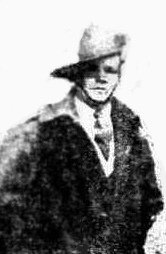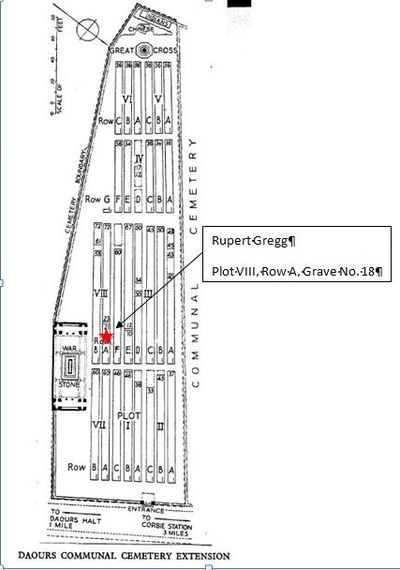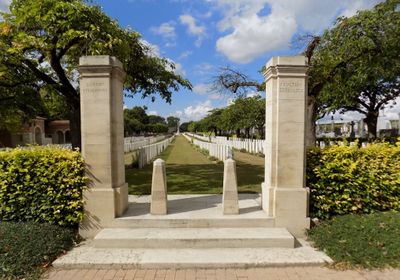Difference between revisions of "Rupert Gregg"
From Our Contribution
| Line 76: | Line 76: | ||
Allocated to the 44th Battalion, then forming up and training in Claremont. Rupert travelled with them to England, and on 18 Jun 1916 while still aboard the Suevic he was charged with gambling and fined a day's pay. While in England he also ran foul of military law, and on 16 Nov 1916 he was charged with having been AWOL from midnight 9 Nov until 3pm 13 Nov 1916. Awarded 4 days Field Punishment No.2, and loss of 8 days pay. | Allocated to the 44th Battalion, then forming up and training in Claremont. Rupert travelled with them to England, and on 18 Jun 1916 while still aboard the Suevic he was charged with gambling and fined a day's pay. While in England he also ran foul of military law, and on 16 Nov 1916 he was charged with having been AWOL from midnight 9 Nov until 3pm 13 Nov 1916. Awarded 4 days Field Punishment No.2, and loss of 8 days pay. | ||
| − | The 44th Battalion trained at Larkhill before it proceeded to France through Southampton on 25 Nov 1916, and by 28 Nov 1916 they were in billetes at Steenwerck, northern France. In France Rupert was sent to an army school (nature not disclosed) for a fortnight in April 1917. On 8 June 1917 the battalion participated in the attack on Messines Ridge, and while they suffered relatively light casualties in the taking of ground, they were then subjected to an incredibly heavy bombardment which caused some 300 casualties for the battalion alone. Rupert was one of these, being treated in turn by 9th Australian Field Ambulance, and the [[2nd Australian Casualty Clearing Station]] before being admitted to the 12th General Hospital in Rouen the next day. On 29 Jun 1917 he was released to the 2nd Convalescent Depot, where he remained, being treated for Shell shock until 19 Sep 1917 when he was released to the Base Depot. On 29 Sep 1917 he was back with the 44th Battalion at Poperinghe in Belgium. | + | The 44th Battalion trained at [[Larkhill]] before it proceeded to France through Southampton on 25 Nov 1916, and by 28 Nov 1916 they were in billetes at Steenwerck, northern France. In France Rupert was sent to an army school (nature not disclosed) for a fortnight in April 1917. On 8 June 1917 the battalion participated in the attack on Messines Ridge, and while they suffered relatively light casualties in the taking of ground, they were then subjected to an incredibly heavy bombardment which caused some 300 casualties for the battalion alone. Rupert was one of these, being treated in turn by 9th Australian Field Ambulance, and the [[2nd Australian Casualty Clearing Station]] before being admitted to the 12th General Hospital in Rouen the next day. On 29 Jun 1917 he was released to the 2nd Convalescent Depot, where he remained, being treated for Shell shock until 19 Sep 1917 when he was released to the Base Depot. On 29 Sep 1917 he was back with the 44th Battalion at Poperinghe in Belgium. |
Soon after his return the Battalion was sent back to the front, and on 4 Oct 1917 he received a shell wound to his left arm. Rupert was one of a small number of casualties suffered by the battalion in their attack, with almost all resulting from enemy artillery action. Rupert was treated by the 64th Field Ambulance and the 4th Casualty Clearing Station, before being admitted to the 1st Canadian Stationary Hospital in Étaples On 11 Oct 1917 he was embarked on the [[HS Stad Antwerpen]] for England where he was admitted 11 Oct 1917 to the War Hospital at Clacton-on-sea in Essex. On his recovery he was granted furlough from 11 - 25 Dec 1917, and took the opportunity to extend it until 5pm on 3 Jan 1918. Found guilty of AWOL and awarded 10 days Field Punishment No.2 and 20 days loss of pay. | Soon after his return the Battalion was sent back to the front, and on 4 Oct 1917 he received a shell wound to his left arm. Rupert was one of a small number of casualties suffered by the battalion in their attack, with almost all resulting from enemy artillery action. Rupert was treated by the 64th Field Ambulance and the 4th Casualty Clearing Station, before being admitted to the 1st Canadian Stationary Hospital in Étaples On 11 Oct 1917 he was embarked on the [[HS Stad Antwerpen]] for England where he was admitted 11 Oct 1917 to the War Hospital at Clacton-on-sea in Essex. On his recovery he was granted furlough from 11 - 25 Dec 1917, and took the opportunity to extend it until 5pm on 3 Jan 1918. Found guilty of AWOL and awarded 10 days Field Punishment No.2 and 20 days loss of pay. | ||
Revision as of 00:16, 10 March 2019
 Sunday Times 3 Nov 1918 page 6 | |
| Personal Information | |
|---|---|
| Date of Birth |
not known "not known" contains an extrinsic dash or other characters that are invalid for a date interpretation. |
| Place of Birth | Collingwood, Victoria |
| Death | 26 Aug 1918 |
| Place of Death | near Bray, France |
| Age at Enlistment | 26 years, 9 months |
| Description |
5'5" (1.65m) tall ; 122 lbs 55.338 kg ; dark complexion ; brown eyes ; dark hair |
| Occupation | Horse driver |
| Religion | Roman Catholic |
| Address | Jarrahdale Bush Landing, Western Australia |
| Next of Kin | Wife , Mrs May Edith Gregg |
| Military Information | |
| Reg Number | 798 |
| Date of Enlistment | 21 Feb 1916 |
| Rank | Private |
| Unit/Formation | 44th Battalion, 1st Reinforcement to D Company, 15 Platoon / 11th Brigade, 3rd Division |
| Date of Embarkation | 6 Jun 1916 ‒ 21 Jul 1916 |
| Ship Embarked On | HMAT A29 Suevic |
| Fate |
Wounded in Action 10 Jun 1917 Messines Wounded in Action 4 Oct 1917 Broodseinde Wounded in Action 25 Aug 1918 Bray Died of Wounds 26 Aug 1918 at 55th Casualty Clearing Station |
| Monument |
Jarrahdale War Memorial Jarrahdale Honour Roll ANZAC Memorial Park (Byford) Australian War Memorial |
| Medals |
British War Medal Victory Medal |
Contents
Pre War
Rupert married Edith May Lakeman in Perth during 1908. (Her given names were reversed on her Burial record). Rupert had trained as a pastry cook for 4½ years in Victoria before coming to WA.
War Service
Allocated to the 44th Battalion, then forming up and training in Claremont. Rupert travelled with them to England, and on 18 Jun 1916 while still aboard the Suevic he was charged with gambling and fined a day's pay. While in England he also ran foul of military law, and on 16 Nov 1916 he was charged with having been AWOL from midnight 9 Nov until 3pm 13 Nov 1916. Awarded 4 days Field Punishment No.2, and loss of 8 days pay.
The 44th Battalion trained at Larkhill before it proceeded to France through Southampton on 25 Nov 1916, and by 28 Nov 1916 they were in billetes at Steenwerck, northern France. In France Rupert was sent to an army school (nature not disclosed) for a fortnight in April 1917. On 8 June 1917 the battalion participated in the attack on Messines Ridge, and while they suffered relatively light casualties in the taking of ground, they were then subjected to an incredibly heavy bombardment which caused some 300 casualties for the battalion alone. Rupert was one of these, being treated in turn by 9th Australian Field Ambulance, and the 2nd Australian Casualty Clearing Station before being admitted to the 12th General Hospital in Rouen the next day. On 29 Jun 1917 he was released to the 2nd Convalescent Depot, where he remained, being treated for Shell shock until 19 Sep 1917 when he was released to the Base Depot. On 29 Sep 1917 he was back with the 44th Battalion at Poperinghe in Belgium.
Soon after his return the Battalion was sent back to the front, and on 4 Oct 1917 he received a shell wound to his left arm. Rupert was one of a small number of casualties suffered by the battalion in their attack, with almost all resulting from enemy artillery action. Rupert was treated by the 64th Field Ambulance and the 4th Casualty Clearing Station, before being admitted to the 1st Canadian Stationary Hospital in Étaples On 11 Oct 1917 he was embarked on the HS Stad Antwerpen for England where he was admitted 11 Oct 1917 to the War Hospital at Clacton-on-sea in Essex. On his recovery he was granted furlough from 11 - 25 Dec 1917, and took the opportunity to extend it until 5pm on 3 Jan 1918. Found guilty of AWOL and awarded 10 days Field Punishment No.2 and 20 days loss of pay.
In Feb 1918 he was transferred to Tidworth where he was on the strength of the AIF headquarters. On 1 May 1918 he was transferred to the Overseas Training Brigade until 3 Jul 1918 when he again proceeded overseas to France, where he rejoined the 44th Battalion near Hamel on 10 Jul 1918.
Rupert was soon after in trouble, being charged on 3 Aug 1917 with"An act to the prejudice fo good order and military discipline in that he (1) wilfully gave information on military matters in a written letter by him on 26 Jul 1918, contrary to censorship regulations, and (2) wilful endorsed a envelope with a signature purporting to be that of an officer censoring military correspondence. Award 7 days Field Punishment No. 2 by Maj W.H.Rockliffe 29 Jul 1918.
On 25 Aug 1918 Rupert was wounded a third time, on this occasion with a wound to his abdomen. Carried from the field, he was seen by the 9th Field Ambulance and the 55th Casualty Clearing Station where Rupert died the following day and was buried in the Daours Cemetery.
The Red Cross File contains a brief report on his death [1]." We were lying down about 20 minutes before the hop-over in the early morning, under heavy machine gun fire, awaiting orders, when Gregg was hit by a Machine Gun bullet. I was about 6 feet away. He was paced on a stretcher and taken to the Regimental Aid Post about 250 yards off." Piggott A.M. 2319An alternative narrative is contained in Neville Browning's book "The Westralian Battalion", page 366 which credits D. Fryer-Smith who wrote
"We start out moving in single file, advance towards the starting point. The enemy is not too restful tonight as they keep sending over gas shells and as we have to move across a valley it does not appeal to us. Moving down into the valley on the Bray-sur-Somme - Corbie road, the machine guns open enfilade fire and we have to crawl and there is just room to move on the stomach without being seen. One poor beggar turning over raised himself, apparently, and was hit in the stomach, his cry for help as we move into the valley full of gas, is appalling and I feel a coward. How terrible it all is and will it never end? We put on our gas masks and move through a deserted village, taking up our positions on the other side of the valley, still wearing masks."[2]A Newspaper in W.A. reported that Rupert Gregg of Jarrahdale had been wounded and was considered to be in a dangerous state.[3]
Wife May, and five children living in Jarrahdale. May died 15 May 1959 aged 68 in East Victoria Park.
Notes
Buried in Daours Communal Cemetery Extension, France (Plot VIII, Row A, Grave No 18). Daours is about 10 kilometres east of Amiens on the northern side of the Somme River.
- ↑ "Australian Red Cross Wounded and Missing Files - Rupert Greg". Australian War Memorial. 2018. Retrieved 2 May 2018.
- ↑ 'The Westralian Battalion - The Unit History of the 44th Battalion A.I.F., Neville Browning, Advance Press, 2004, page 366 & end note 4 on page 396
- ↑ Kalgoorlie Sun 15 Jul 1917 page 3
External Links

